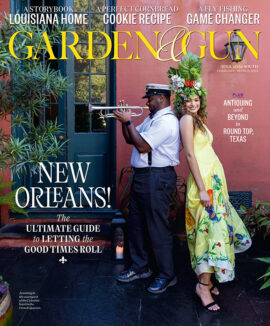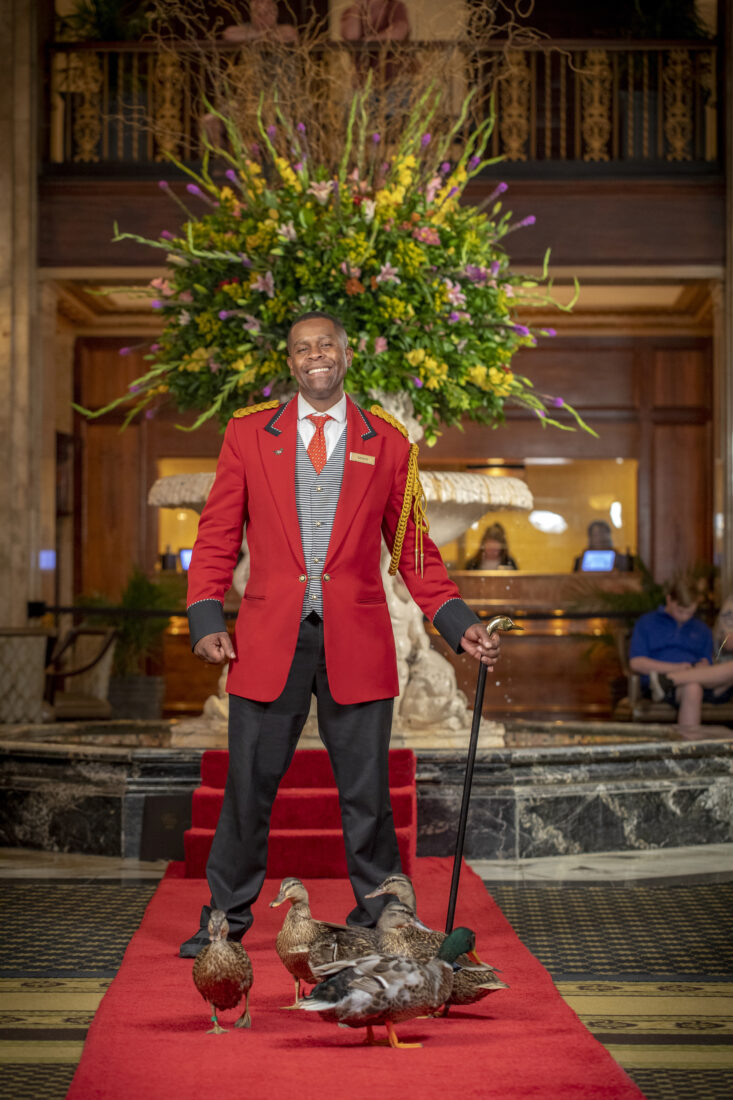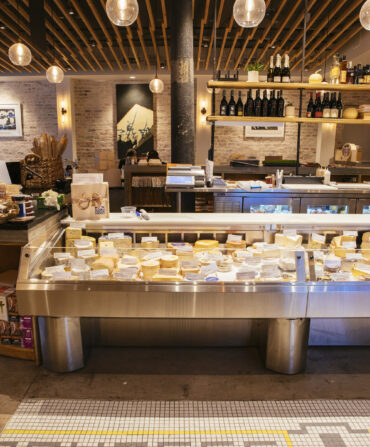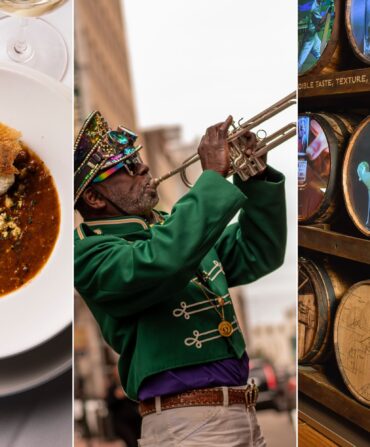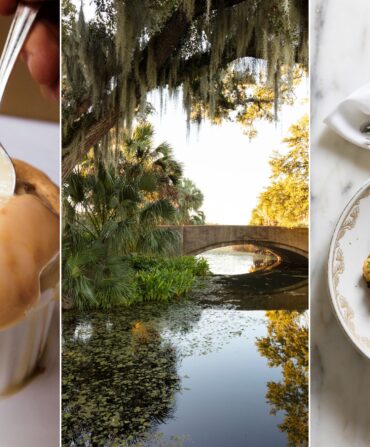In January 2020, two months before COVID-19 shut the world down, Kenon Walker snagged one of the most highly coveted jobs in Southern hospitality: that of the Peabody Memphis’s duckmaster.

Since the 1930s, the Peabody has been synonymous with the mallards that spend their days in the historic hotel’s central fountain, a tradition that began in the 1930s when an over-served general manager brought his (then-legal) live decoys back from a day in the field. As the caretaker and trainer of the five ducks—a new set of which rotates in from a local farm every ninety days—the duckmaster’s role is not only to walk them down from their rooftop “Royal Duck Palace” to the lobby fountain and back every day, but also that of ambassador, historian, and storyteller.
Here, Walker shares why perhaps no other duckmaster in Peabody history has been so uniquely suited to the role.
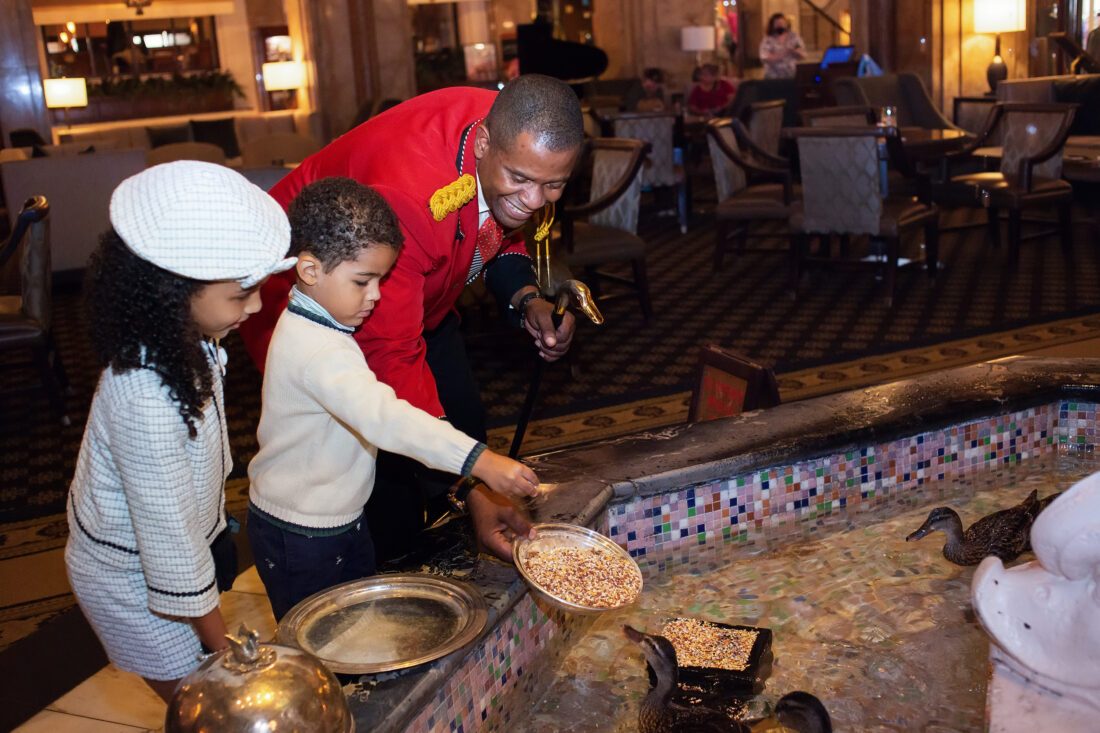
You consider your role as duckmaster a calling. Can you explain that?
My mom put me in a theater camp when I was thirteen, to keep me out of trouble that summer. That started me on my acting journey. After acting for a decade and a half, my path led me to the National Civil Rights Museum. Then, after being there for three months as part of the living history tour, I was so overwhelmed and affected by being in the museum that I wanted to stay and find a way to teach that history to people. That led to me becoming a tour guide and a docent and educator.
I went from there to the Stax Museum to the Brooks Museum to the Peabody; I came to work initially as a concierge. There was a duckmaster named Anthony who was here at that time; a man named Doug Weatherford was the assistant duckmaster, but he was also the hotel historian. When he found out about my historian background, Doug took a vested interest in me. He would come and speak to me every time he marched the ducks. Three months later, Anthony’s wife had a baby and he retired. Doug became the official duckmaster and offered me the assistant duckmaster position.
I told him no three times. I had just been promoted from being the lobby concierge to the new private club floor concierge one week before he asked me. I was finding my footing on the club floor. The perks were nice, so I thought I was where I was supposed to be.
But Doug was adamant. He asked me a total of seven times. I was like, okay, man, you must be seeing something I’m not seeing here. So I prayed about it, and I woke up with this complete sense of peace about wanting to try it out, and a certain level of excitement about what I could bring to the ceremony as an historian, as an actor, as an educator, as a public speaker.
All of those skills directly feed into what I currently do. I give a history presentation every day as part of the performance. I’m speaking to an international crowd ten times a week. The years at the Civil Rights Museum and Stax and doing driving tours sharpened my skills as far as giving the history tour.
It’s like a platform was created that allows me to showcase everything that makes me me. All I had to do was learn how to train ducks.
What is that training like?
When I started as assistant duckmaster, I had to try to find my approach on how to connect with the ducks. I would find myself just kind of staring at them. I was like, “Okay, my ducks, we’re gonna be working together. So, if you make me look good, I make you look good.”
But then I was up in the Duck Palace one day, and it hit me: It’s like, man, your path led you into becoming a duckmaster at the Peabody. You owe it to yourself to go all in, lose yourself in this. Don’t worry about if you look silly talking to the ducks. You’re the duckmaster.
Now I look forward to it. I start the morning speaking to them and getting them ready for the morning march. I have full conversations with them. I speak life into them. I tell them good morning; tell them, we’re going to march with purpose. We’re going to march with joy into that lobby.
I guess to the kid in me that didn’t have pets growing up, there’s something really cool about connecting with five ducks to the point where they’re excited to see me, and then training them to get from the point where they’re initially scared and unsure of themselves, to where they’re marching with such pride that it’s worthy of a red-carpet entrance for the world to see.
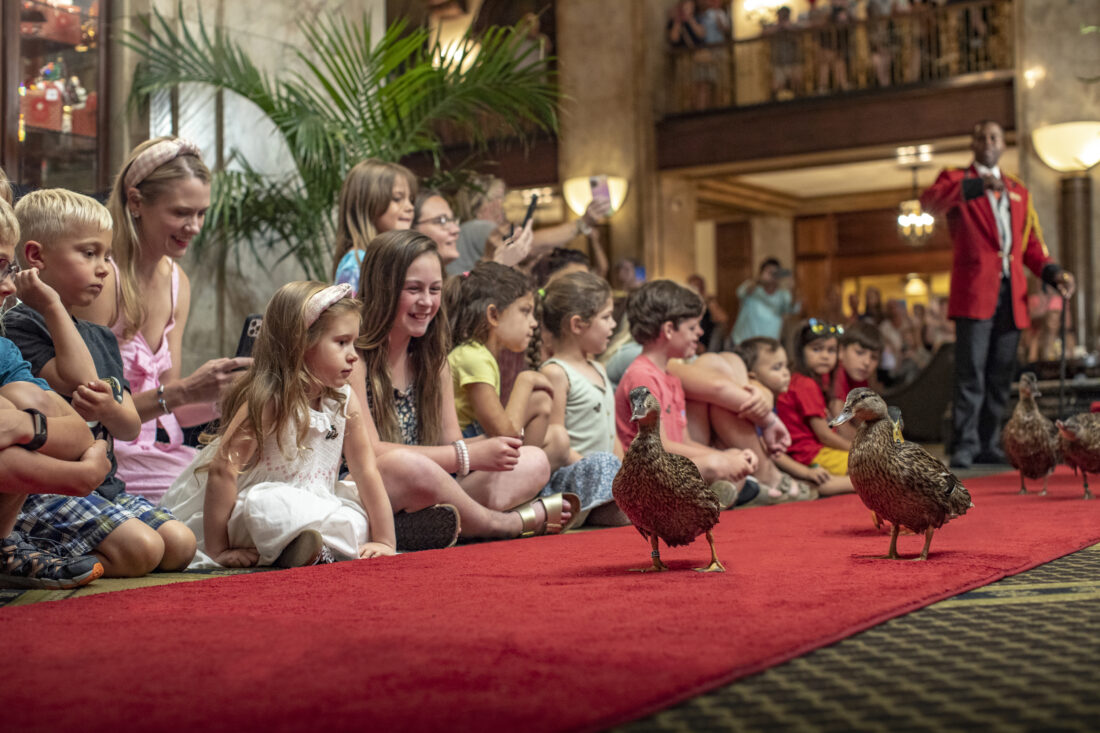
What’s a typical day like for you at the Peabody?
I get here about 9:30, go up to the rooftop, clean out the Duck Palace. That’s the non-glamorous part of the job. I feed the ducks romaine lettuce—they love romaine. Then I kind of give them a motivational talk. I go back downstairs, switch into my duckmaster uniform, and get to the lobby about 10:15, 10:20 to get the red carpet. I pick some kids out to help me unroll the carpet. Then, of course, I’ve got the morning duck march at eleven.
Sometimes I have an honorary duckmaster, somebody who may have signed up to march the ducks with me. If so, I build rapport with them, make them comfortable. Some people are excited to do it. Some people are terrified.
After the morning duck march, I give an hour-long history tour. After the tour, I feed the ducks again, and then it’s time for me to go to lunch. I check emails, check to see if there’s anything coming up that I need to kind of be focused on for the next duck march. Then I go up to the Duck Palace, get their food ready for the evening, and about four o’clock, I’ll go back to the lobby, start getting set up for the evening duck march at five. Once the evening march is over, I’ll speak to the guests in the lobby. After that it’s time to hang up the jacket.
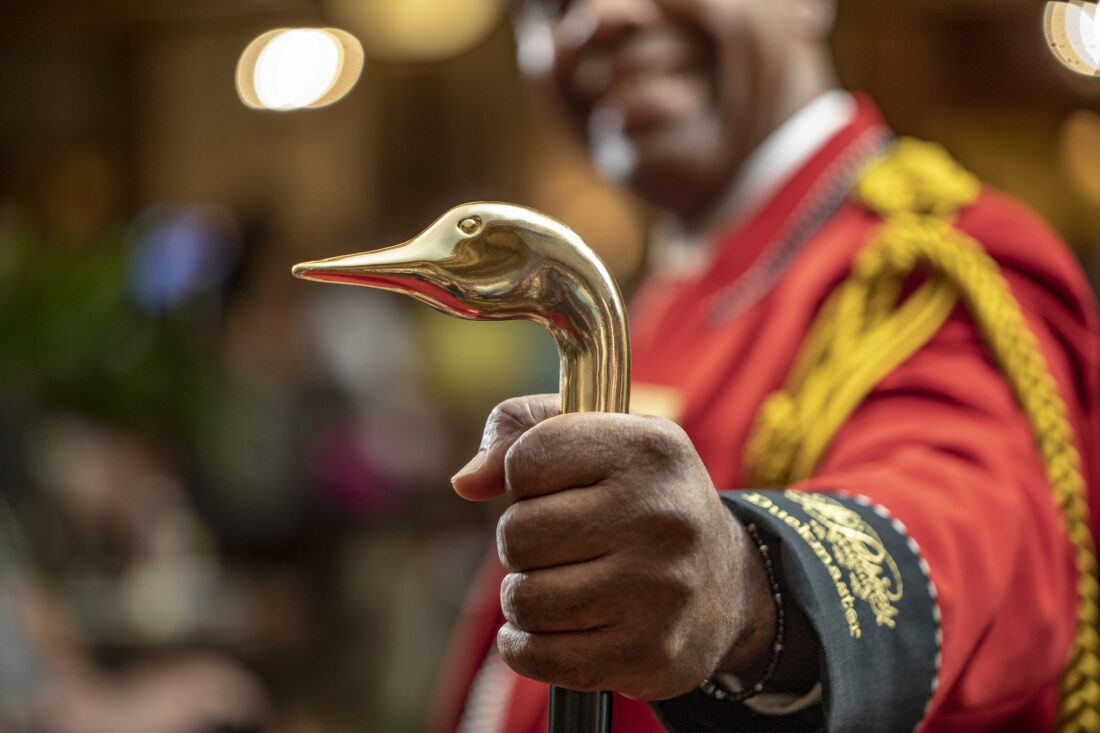
What is the best part about being the duckmaster?
Other than bringing joy to people and connecting, the opportunity to defy stereotypes. I’ve never seen anyone who looked like me do what I do. People write me these letters after meeting me, and they’re such deep, heartfelt, really emotional letters about how they were impacted in the moment. I know that wouldn’t have happened on the street. If we were on the sidewalk, that connection would not have happened that way.
You are the first Black duckmaster since Edward Pembroke, who worked in the role for fifty years, until his retirement in 1991. Was that daunting?
Mr. Pembroke was hired as a bellman in 1940. Seven years prior, the general manager and a friend had gotten drunk on a duck-hunting trip, bought the live duck decoys back to the hotel, and set them loose in the fountain as a practical joke. It became a staple to have ducks living in the fountain, but the bellmen had to care for them.
The bellmen weren’t trained to do that, so it was probably a kind of a humiliating position. It was a segregated hotel at that point, so there’s no telling what kind of treatment they received, having to take care of the ducks. But Mr. Pembroke came in and he made sense of that chaos. He just so happened to have been an animal trainer in the circus, and he knew how to train ducks. He started the ceremony in 1940 that the Peabody is now known for worldwide.
He held that position fifty-one years, and half that time, the hotel was segregated. So Black people couldn’t come see him do what he did. Now a whole generation of people have the chance to see someone that looks like me fulfill this position. I’m carrying on his legacy.
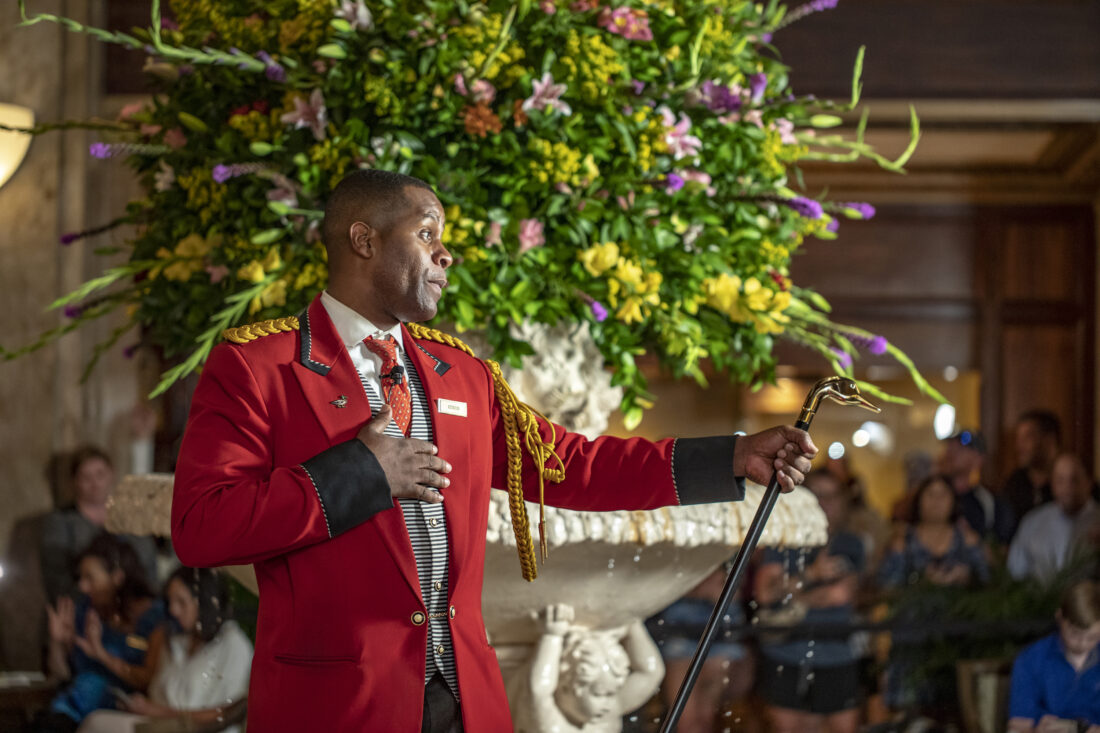
Who else has inspired you?
I had an uncle named O’Landa Draper who was a gospel artist. He passed away in 1998. He had a choir called O’landa Draper and the Associates. He was a Grammy Award winner, Stella Award winner, Dove Award winner. But as a kid, he was just my uncle who started the choir. I was the kid that was in the way, always, playing with the drums, but then I watched him get a record deal. He would take me on the road to performances. He would let me perform in front of thousands and thousands of people. It was because of him that I knew that big things were possible.
I think a lot of people feel like things aren’t possible because they’ve never seen anybody that they know do certain things. If you only stay inside your seven, eight-block radius, you think that’s what the world is. But he included me in big things, so I never felt like big things couldn’t happen for me.
What would you tell young people unsure of their own paths in life?
Be inspired by people and what they have done, but don’t try to emulate anyone, because that person’s past is that person’s past. We all have gifts. We all have talents. Be yourself. Be who God made you to be, unapologetically, and then search deep within you for that thing that you would do for free for the rest of your life if you could do it. If you put your all into that, and you do it for the gratification of doing it, you’re going to find yourself tapping into your purpose.

